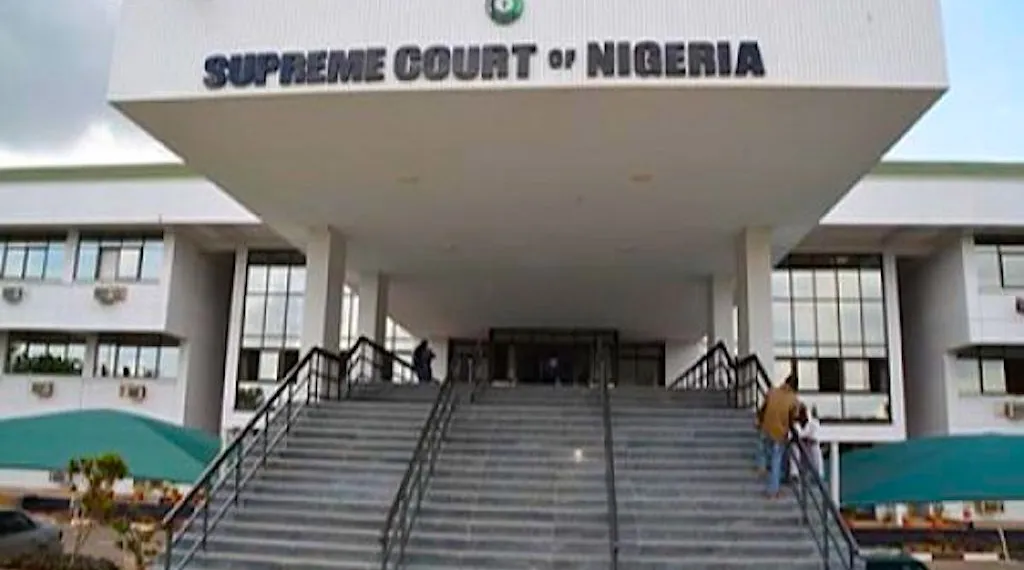The Supreme Court in Nigeria, as in most countries around the globe, is the highest judicial authority in the country. It is often referred to as the court of last resort because its judgments are final and cannot be subjected to any review by another court.
According to the 1999 Constitution of Nigeria, Section 230 (2), the Supreme Court of Nigeria shall consist of the Chief Justice of Nigeria and such number of Justices of the Supreme Court, not exceeding twenty-one, as may be prescribed by an Act of the National Assembly. The Supreme Court Justices are appointed by the President on the recommendation of the National Judicial Council (NJC) and subject to confirmation by the Senate.
The constitution also gives exclusive jurisdiction to the Supreme Court over disputes between the federation and a state or between states; as well as jurisdiction to hear and determine appeals from the Court of Appeal. The Supreme Court shall have such original jurisdiction as may be conferred upon it by any Act of the National Assembly.
But as many have observed, including the Chief Justice of Nigeria, Olukayode Ariwoola, the Supreme Court is always under pressure due to the number of cases it is expected to handle and the manpower at its disposal. Speaking in November 2022 at the investiture of 62 new Senior Advocates of Nigeria in Abuja, the CJN said “Available facts on judicial activities in various jurisdictions across the globe still emphatically confirmed that the Supreme Court of Nigeria remains the busiest and most hardworking Supreme Court in the world.
“It is on record that we work from Monday to Friday every week. We conduct sittings on a daily basis. It is only on Wednesdays that we do Chamber sitting to consider non-contentious matters. On Fridays, we deliver judgments and rulings. We are humans and equally have blood running through our veins; if no one praises us, we have the inalienable right and obligation to praise and eulogise ourselves.”
With a staggering 6,884 cases at the apex court, as the CJN noted, the number of the justices’ to determine the cases is depleting, thereby slowing down the wheels of justice. And as the legal maxim goes, ‘justice delayed, is justice denied’. Between April 2020 and September 2023, seven justices of the court either voluntarily resigned after attaining the mandatory retirement age of seventy years (70) or died. They include Justice Paul Galinje who retired on April 21, 2020, Justice Mary Peter Odili retired on May 13, 2022; followed by Justice Ejembi Eko on May 23, 2022. Justice Ibrahim Muhammed retired on June 27 and Justice Abdu Aboki retired in August, all in 2022. Justice Centus Chima Nweze died on July 30, 2023.
Indeed, with the most recent retirement of Justice Amina Augie on September 3, 2023, after clocking the mandatory age of 70, the number of justices at the Supreme Court now stands at 11. Before now, the number of justices of the court unprecedentedly rose to 20 in November 2020, after President Muhammadu Buhari approved the elevation of eight justices at a go.
Speaking at the valedictory court session in her honour, Justice Augie said “One remarkable day, we found ourselves entertaining an appeal in an unusual criminal case. Surprisingly, it was not the accused or convict that had filed the appeal; it was the State. The case involved an incident of arson where 12 goats were set ablaze.
“As we grappled with the load of pending judgments and the stack of files awaiting review for our upcoming conference — a sacred ritual in this Court — l could not help but voice my astonishment. I leaned over to my brother Justice and whispered, ‘with all that is on our plate, why would such a case come before us?’ Our primary role here is to be a policy-making court. Something must change. This court is the apex court, and its final decisions shape society’s social order. Justices should be able to focus on what truly matters.”
While calling on the National Judicial Council to expedite action by recommending Justices to the president for appointment as Justices of the Supreme Court, we also join the calls for the amendment of the constitution to restrict the circumstances under which appeals can reach the Supreme Court. For instance, interlocutory appeals should not be allowed to go up to the Supreme Court, when such appeals could end at the Court of Appeal.
Also, as the CJN and other stakeholders have said, Nigerians should be encouraged to leverage on the various alternative dispute resolution (ADR) mechanisms across the country, with a view to freeing the courts of the case-overload. This approach, which is often confidential and away from the eyes of the public, will also save time and money for both parties in a disagreement.
The supreme court must be positioned in terms of personnel and focus to be able to perform its duties effectively.

 Join Daily Trust WhatsApp Community For Quick Access To News and Happenings Around You.
Join Daily Trust WhatsApp Community For Quick Access To News and Happenings Around You.


